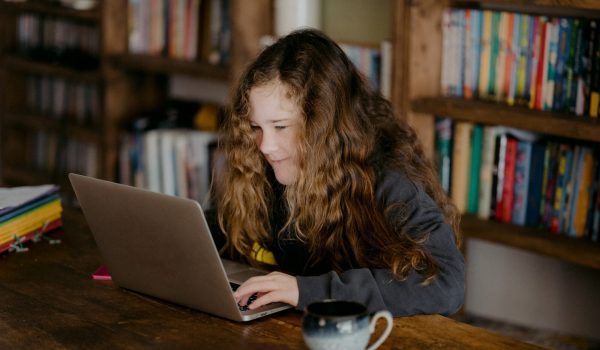 If you didn’t have time to send your homework, you had to write to the teacher in a messenger. If you do not know the answer during the lesson, Google it. And if you’re tired of everything, close Zoom and open YouTube. Moscow school students have survived nine months of distant education. What do they think about this experience? Ksenia Knorre Dmitrieva spoke with teenagers.
If you didn’t have time to send your homework, you had to write to the teacher in a messenger. If you do not know the answer during the lesson, Google it. And if you’re tired of everything, close Zoom and open YouTube. Moscow school students have survived nine months of distant education. What do they think about this experience? Ksenia Knorre Dmitrieva spoke with teenagers.
If I sat through the lesson and did not go to YouTube, I did well
Dasha, 9th grade:
“I noticed that during the distant educations things that prevented me from studying at school became more obvious. If it was difficult for me to concentrate at school, at home I have even more opportunities to get distracted.
If at school you could chew on a pencil, shake your leg, draw in a notebook in Chemistry, then at home you can also minimize the Zoom window, turn down the volume and watch YouTube. And it is very difficult to counteract this, but if I succeeded, it gave me more joy: I sat through the whole lesson and did not go to YouTube – oh, I’ve done well!
It was at the distance education that I unexpectedly fell in love with Physics. Our teacher adapted to this format so well, drew pictures on a virtual board, switched through screens easily. It was great and interesting.
But, for example, we had video lessons in Social Studies before, but during the distant education, they became even more boring, because at school we could laugh at the pictures with classmates in the classroom, text each other, exchange glances, but here we could only exchange messages via Zoom.
What did I miss during the distance education? First of all, communication. Not even just communication, but the liveliness of what is happening, the feeling of living people around you. It is much more pleasant to sit in the classroom, to see the response of other students, the teacher, and to have a constant opportunity to ask something. It is much easier to do this at classroom, because when you turn on your microphone [during the Zoom lesson], everyone falls silent, and you pay much more attention to what you are saying, so you go like: “Can you please say that again… from the very beginning, please, I didn’t understand anything”…
In the classroom, teachers have more pressure factors on us, but here they did not check all the homework. Therefore, during distance education, the question is not that they will give me a bad grade if I don’t do something, but what I’ll lose for myself.
At the distance education, teachers are more human, because with this kind of education they have more problems, and they talk about it. Suddenly it turned out that they are people too, and they also have an electronic progress report, which doesn’t work right, the Google class doesn’t load either, Zoom is constantly being updated, and so on. The distance education has brought us closer to the teachers, and provided us with more opportunities for personal communication.
I also didn’t expect it that you can actually forget to eat, if nobody gets you out from your room, while you are studying.
It was very difficult to communicate during distance education. During the summer holidays, you usually hardly communicate with your friends from school, even if you are all in the city. No one really cares what you are up to, so when you return to school, you continue to communicate from the last time you met in the spring. With distance education it was the same: almost no one met with any friend from the school, although there was such an opportunity. We almost did not text each other, because it was strange to text someone with whom you are used to talk only in person.
And you had such phantom pain during the lessons in Zoom, because you noticed a funny thing and thought who you’d laugh at this with, if you were at school. You found a way to share it and wrote to a friend on WhatsApp: “Oh, look, the teacher has the TikTok folder open.” But this was not the same at all [as laughing at something, during class at school -Tr.].”
I couldn’t go outside, because I was too busy
Arina, 8th grade:
“Distant education had many advantages: you could sleep longer, skip a lesson, and no one would notice. But there were also disadvantages. I couldn’t see my friends, talk to them about our worries, and simply hug each other. I couldn’t stay after the lesson, if I didn’t understand the subject.
There were also electronic problems: the log did not open, the test did not load, the homework was not completed, Teams crashed or did not load, and so on. Some of the teachers did not know how to use screen sharing or simply did not understand how to write on the electronic board or in Paint, and so not everything was clear.
One time a stupid and unpleasant situation happened to me: I mixed up the days in the journal and waited for about 10 minutes until they would “let me in” to an online lesson. Desperate, I wrote to a classmate and learned that I was not at all where I should have been.
But there were also more significant problems.
First, we constantly looked at screens – computer, laptop or the phone’s – for seven hours a day with virtually no breaks.
We harmed our sight much more than usual. Also, constant sitting is bad for one’s back.
A friend of mine recently said that for four hours she did not get up from the table at all, because she was doing some class assignments and homework. Sometimes I didn’t have time to go outside during the day.
Second, some people started to worry about their grades during the distant education a lot more than usual, and because of this, they could have mental health problems. And some students simply did not have time for lessons or considered distance education to be an opportunity to skip classes and not learn anything.
I don’t know how many advantages can be found in distance learning (I see only two, three tops). There are much more disadvantages.”
I became an excellent user of Google during the distant education
Sasha, 10th grade:
“I became an excellent student in distance learning even in April. And by the New Year, I had only one C grade, although usually I had four, and I am an excellent student in most subjects: I have A+ in 70 % of the subjects.
There are two reasons. First, during the distance education, I had much more free time to study: there was no need to get up early, I was able to rest more, and I attended the lessons feeling fresh.
And second, my mistakes at school, related to my poor studying, inattention, etc., were compensated at distance education by the fact that I Googled some of the answers. In a regular lesson, there is no opportunity to look something up in the Google, as opposed to distance education. Therefore, my grades improved.
Although, I didn’t do it much with the subjects that I like or with which I plan to connect my life. I didn’t cheat at algebra, geometry or English at all. And there are subjects that I never spent much time on, such as chemistry and biology. I always cheated at them and managed to get A. In fact, I really have no knowledge of them, but I don’t really need them.
Besides, during distance education, I could devote time to my hobbies. For example, I started playing the electric guitar, took boxing classes and took part in the first competitions, worked hard in economics, and also managed to earn money in parallel with my studies. All this was thanks to the fact that during distance education, I could cheat at the subjects that I spent a lot of time studying at school.
Of course, I missed personal communication. I am an extrovert, and it was very difficult for me without my group of friends from school. I could, of course, meet with some of them, which we did from time to time. But when there are two or three of you, it is not the same at all, as when there are one hundred people at school and they are happy to see each other.
And besides, everyone was busy, including me. I was preparing for the Economics Olympiad, so I couldn’t go for walk with my friends more than once a week. In addition, at school I communicate with all students of the tenth grades and, probably, with half the students of the eleventh grades. So it is very difficult to organize such a meeting with all of them.
My back did hurt really from sitting at the desk, but warm-ups during breaks helped. And the eyes… It seems to me that this could be a very long discussion on the topic that the screen does not actually harm the sight, but only adds to eyes’ fatigue, and a short warm-up between lessons helps to keep them in good condition. But, I must say, since I study at school with a programming area of expertise, I always spent a lot of time on the computer.
I have a group of friends from the class who used to sit on Discord all the time before. This is something like Zoom, only it is optimized well. It is not necessary to turn on the camera there, there are chats, voice channels, text channels. This hangout is mainly for those who play games – it is more convenient for them to switch between channels to communicate with someone. During the distance education, many students came up with systems to chat with their classmates during lessons, and talk to them during breaks like they did at school. They created something that was as close as possible to the school atmosphere.”
My classmate gave me the answer, and now my F turned to B
Tikhon, 10th grade:
“Studying at the distance education is much more difficult, because… No, not like this. It’s much easier NOT to study at the distance learning.
There is no problem with skipping lessons. You just didn’t turn on the computer and didn’t come to a class, and then you could say that the electricity was turned off.
But it was really very difficult to actually study. First, because it is difficult to sit at the desk for seven hours a day (I had 7-8 lessons a day), and at the same time not play computer games, but consume information. This was very stressful for both my eyes and the back. I couldn’t sit down somehow relaxed and learn.
Second, it is generally more difficult, because often you don’t see the teacher – either the quality of the connection is poor, or it is simply not needed for the lesson. Because of this, perception from person to person suffers greatly, because it is much easier to learn something when a person explains it, when he can use gestures and there is an effect of his presence. And here it is not clear whether the teacher is doing this now or simply filmed it before the lesson, and simply turned it on, and you just sit and watch.
Everyone’s regime collapsed during the distance education. I have many classmates and not one of them goes to bed at normal hours.
You could find anyone online at one in the morning, and sometimes at 4 in the morning.
Teachers were in almost the same conditions, only it was more difficult for them with organizing exams. Because, frankly speaking, it is very difficult to write something without cheating at the distance education, because the camera will not cover everything around you. There is an opportunity to cheat. Generally, teachers understand this.
Have I discovered something new in my teachers and classmates over this time? I would say that during the distance education, the teachers became more understanding, because it was difficult for them too in this situation.
My classmates have also changed. It’s like you are sitting at home all day, so some students burned out very much because of this. Indeed you can’t even talk during breaks, just text, but that’s not the same. It was difficult to meet each other, because in addition to school activities, many also have tutors, some do sports, so everyone was busy 24/7. During the distance education, you needed to organize a specific event for everyone to come together, instead of just saying: “Let’s grab some coffee” or something like that.
I think there are quite realistic solutions that could make the distance education less tedious. For example, simply reducing the duration of the lessons. It turns out that only those people who really need it participate in them. And 45 minutes is very exhausting for us. Everything we do there can be done much faster.
During the distance education, the teachers didn’t push us, didn’t say that we needed to finish the program and that we didn’t have time to do it. We studied at the speed that was possible. Sometimes we wrote essays. They weren’t exemplary, of course. Because if you felt that your work wasn’t good enough, you could just write to your classmate, he’d send you the answer, and now you have not an “F”, but “B”. I think they will put more pressure on us when we get back to studying in person.
The most difficult thing at the distance education for me was to maintain my desire to learn. In April it was even fun. It was the end of the year, the time for exams, and you could sit and prepare calmly. But later the distant education began to tire me very much, because I had no desire to study, and I needed some forcing, so to say. If you don’t do something at school, they will scold you, give you an F. And here you can write: “I am so sorry, I had force majeure, I could not send my work. Can I do it tonight?” And this happened all the time.”
Teachers became more human during the distance education
Vanya, 7th grade:
“It was difficult to meet with my friends. I’m lucky, I have a brother, but I have no idea how people live without brothers and sisters. It seems to me that they were very sad at the distance education.
Sometimes we met with the classmates. Once our class teacher organized a meeting of the entire parallel at the ice rink.
The distance education was good because you didn’t have to go to school, you could get up later, studying wasn’t as boring. Because sometimes you get tired of having to get up early every day, and there are a lot of lessons, so you don’t always get enough sleep. It’s easier to just sit down at the desk at home and prepare for the lesson.
It was also hard that the lessons often dragged out at the distance education. And when they are all so difficult, the brakes almost disappeared. Often it wasn’t because of the teacher, but students asked questions, and she needed to explain something to someone, and it wasn’t always clear when the lesson ended.
I think that it would be easier for us at the distance learning, if we spent part of the time at school and part of the time at home, and also if the school helped organize class meetings.
But in general, we live far from each other, it is not very convenient for us to meet. Sometimes I realized that I had homework. And when you have done everything, there is no time left. Until you get to some meeting place, you will not have time to talk normally, to go for a walk together, and soon you will have to go home. But when you are at school, you can take a walk with your friends, before going home.
Most of the teachers tried to help during the distance learning. They were sociable with us. We even talked more than at school. Some students are very fond of talking and, apparently, because there was less communication, they talked during the lesson with the teachers. And the teachers didn’t seem to mind. They became more human, or something.”
Distant education taught me that not only school gives us knowledge
Fedor, 11th grade:
“Distance learning suits me more than studying full-time. I have more time this way.
First, I don’t go to school. Second, all my materials are within walking distance from me. I have books, computer, and the Internet is right here. And I’m probably saving my energy, so there’s more resource.
In the spring, at the first stages of the distance education, it was more difficult for me. I was its determined opponent. At that time, the pandemic had not yet reached the same scale as it has now, but the panic was severe. It seemed ridiculous, why are you doing all of this at all when it is too early to panic? Then it turned out that these measures made sense. When the number of cases exceeded 100 thousand people, mortality increased, and all kinds of transitions to the plateau ultimately ended in nothing, it became clear that this was serious, it would last for a long time, and something needed to be done.
Our schedule was still slightly edited in connection with the distance education: some lessons went into the following format: the teacher sent a task, and we did it later. And I began to use such moments to my advantage, that is, to determine when I would better do this task and what to spend the free hour on.
And there was also an opportunity to do something urgent sometimes even during another lesson.
I did not suffer from a lack of communication, I did not lose it: I met with friends during the distance education and talked with them in person.
The teachers, since we are a graduating class, have some nervousness, not even because we have to be prepared, but because it is not entirely clear how it will all look like. It is unclear what the USE* will be like this year [* Uniform State Exam -Tr], what the final stages of the Olympiads will be, and how all of this will be organized in general… But I noticed that the teachers understood that not everything was needed to be studied at the distance education and that it was not necessary to overwhelm students with too much homework in all subjects equally.
What will I understand for myself personally from the distant learning? Probably, it is the fact that, first, we must always be prepared for the fact that the conditions in which we find ourselves can change dramatically. Second, it is the fact that some separate moments of education will have to be filled in by yourself.
It seems to me that distance learning has become a good lesson for all of us: the source of knowledge is not only a lesson, but also personal work outside of school.
We realized that most of the knowledge should be obtained not at school, but on our own.
I feel a certain inequality. Moscow 11-graders were at the distance education, while almost the whole country was studying at school full-time, and we will take the USE according to the same criteria. But at the same time, we have constant access to the Internet, and I am trying to do a lot on my own.
My motivation at the distance education did not suffer in any way, because in 11th grade the most important thing is the result. You may like the process, you may not like it, but you have to enter a university.
Perhaps not everyone can do this. I know a huge number of people who tell me: “No, it’s hard for me to receive and learn everything through the screen.” But I consciously chose this principle that by the 11th grade you need to learn to adapt, because sometimes there are situations when, like it or not, for the sake of a happy and calm life, something needs to be done.”

















